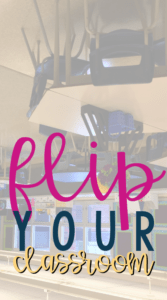
Normally you follow the pattern of teach-practice – assess but what if you flipped that?
I’ve been experimenting with this in math. I’ve been using some math centres recently. It all started with the daunting task of teaching students how to use a protractor. If you have ever done it before then you would know that this can be a truly painful experience.
I though this was a great time to start some math centres so that I could do this in a more guided format.
When I talk about flipped classroom I am talking about the strategy that has students watching a video or learning a skill prior to you meeting with them.
This means that when they meet with you they work through a problem with you and you help them to implement what they have learned.
Here’s how I have flipped my classroom.
In math, two of my centres are All On Tech and Time With Teacher.
My tech time incorporates a google form quiz and a tutorial video I found on line or created myself.
My meet with teacher often includes a key lesson, math talk, word problem, and/or reflection.
To get started
First we talk about what our learning goal is then they are off to their centres.
I preplan and drop the quiz in their google classroom prior to the week beginning.
I use google forms to set up a quiz that has questions and videos embedded. It asks students questions about what they learned from the video.
In math it is all about leveraging the amazing content that is already available on you tube to go over the content prior to them meeting with you.
In Science:
There are so many opportunities to flip the learning g and move it away from the lecture. Teaching doesn’t need to happen first. You don’t always if ever have to front load the learning.
Let them go then backfill as needed. For instance we went on a field trip first to learn about how to conserve energy. They didn’t know how different sources of energy worked specifically but they could label the different sources from their trip experience. We made a list of them as well as some key questions that would guide our research then they began to utilize their research skills to learn about 1-2 sources and know it well enough to teach their content to others. Not a formal presentations but an opportunity for them to be the teachers. Call it what you want but flipping your instruction is the beginning step to using Inquiry.
Flip where you do the ‘teaching’ it’s time to move it to the back and after the learning. Use your time to build knowledge with your students in a collaborative way.